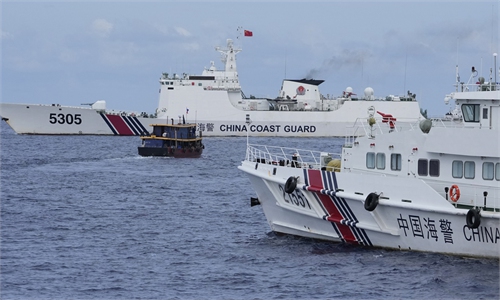S.Korea, India's involvement in the SCS issue could exacerbate division in the region: experts

South China Sea Photo: VCG
South Korea and India are not parties directly involved in the South China Sea issue, and their attempts to get involved are driven by external forces like the US and the pursuit of self-interests, said Chinese experts, who also warned that their intervention will only exacerbate the divisions and conflict in the region, after the foreign ministers of the two countries recently expressed so-called grave concerns on the issue.
According to Reuters, South Korean foreign ministry spokesperson Lim Soo-suk told a briefing that "we are gravely concerned about the recent and repeated use of water cannons in the South China Sea," on Tuesday.
Speaking at a press conference during a visit to Manila on Tuesday, India's foreign minister S Jaishankar said that India supports the Philippines upholding its sovereignty and hopes to find new areas of cooperation including in defense and security.
In response, Chinese Foreign Ministry spokesperson Lin Jian said on Tuesday that maritime disputes are issues between the countries concerned. Third parties have no right to interfere whatsoever. "We urge relevant parties to face squarely the facts and truth on the South China Sea issue, and respect China's territorial sovereignty and maritime rights and interests and the efforts of regional countries to keep the South China Sea peaceful and stable," Lin noted.
South Korea and India have been relatively cautious in their attitudes toward the South China Sea issue in the past, but in recent years they have increased their involvement for several reasons, Chinese experts said on Wednesday.
First, there are external factors, namely pushing and encouragement from the US. This also indicates a further coordination of policies between the US and India, Chen Xiangmiao, director of the World Navy Research Center at the National Institute for South China Sea Studies, told the Global Times.
In addition, both South Korea and India have their own interests. For India, the energy resources in the South China Sea region, including oil wells and natural gas, are very attractive. For South Korea, the sea routes in the South China Sea region are very important. "The completely pro-US policy adopted by the Yoon Seok-yeol government has already caused an imbalance in China-South Korea relations, so South Korea is more inclined to tilt toward the US and develop small circles," Chen said. Another consideration is geopolitical, which is to contain China, Chen noted.
The interference of South Korea and India may have an impact on the negotiations between China and other countries in the South China Sea region, further exacerbating division and instability in the region, experts said.

